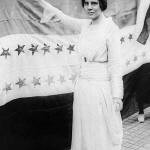Posts Tagged ‘Alice Paul’
Three Ways Not to Celebrate Women’s Equality Day – August 26, 2011
 As second wave feminism gathered peak velocity forty years ago, the late bombastic and behatted Congresswoman (D-NY) Bella Abzug persuaded Congress to designate August 26th as Women’s Equality Day. It recognized the 19th Amendment to the Constitution that in 1920 gave all U.S. women the right to vote.
As second wave feminism gathered peak velocity forty years ago, the late bombastic and behatted Congresswoman (D-NY) Bella Abzug persuaded Congress to designate August 26th as Women’s Equality Day. It recognized the 19th Amendment to the Constitution that in 1920 gave all U.S. women the right to vote.
There are many reasons to celebrate the 91st anniversary of women winning the ballot, which some suffragist leaders mistakenly believed culminated the struggle for women’s rights. But it turns out the solution to a problem changes the problem–creating uncomfortable new questions about the value of equality and what to do once we get there.
We’ve come a long way, maybe…
Read MoreWomen's History Roundup: Create a Movement
Throughout history, men with leadership proclivities have tended to start businesses to create wealth or/and to go into politics. They take the direct path to power for its own sake. Women, on the other hand, tend to start social movements. Susan B. Anthony and women’s rights, Jane Addams and the Settlement House movement, Margaret Sanger and birth control, Candy Lightner and Mothers Against Drunk Driving, and today’s Emily May and Hollaback just to name a few.
The 9 Ways Women’s History Month posts this week are all examples of women starting social movements large and small:
Burning Women: Triangle Fire 100th Anniversary Illuminates Wisconsin Union-Busting
Alice Paul’s Equal Right Amendment Back at the Plow
Violence Against Women: Not in My Backyard – Er, Subway Car
Inspiration from Sin City
What are some other examples of woman-initiated social movements that inspire you?
What new social movement would you start if you could?
Alice Paul's Equal Rights Amendment Back at the Plow
“I never doubted that equal rights was the right direction. Most reforms, most problems are complicated. But to me there is nothing complicated about ordinary equality.” – Alice Paul, suffragist and author of the still-not-ratified Equal Rights Amendment
Yesterday, March 22, was World Water Day. That got a modicum of press. But did you  know it was also the 39th anniversary of the date on which Equal Rights Amendment (ERA) passed out of the U. S. Congress and was sent to the states to be ratified? Probably not. And yet, if there is a resource women need as much as clean water, it must be the guarantee of equality under the law.
know it was also the 39th anniversary of the date on which Equal Rights Amendment (ERA) passed out of the U. S. Congress and was sent to the states to be ratified? Probably not. And yet, if there is a resource women need as much as clean water, it must be the guarantee of equality under the law.
The original ERA, introduced in Congress in 1923, was written by Alice Paul, a women’s rights activist instrumental in the 1920 ratification of the 19th amendment, which guaranteed women’s right to vote. Paul also started the National Women’s Party, believing that without a political organization’s clout, women’s concerns would never be taken seriously by politicians. Paul was also one of the few women’s suffrage leaders who realized that getting the right to vote was necessary but not sufficient to enable women to be equal partners in society. She argued that those who had fought for suffrage should then shift their work to getting laws passed that would continue to expand women’s rights.
“When you put your hand to the plow,” Paul said, “you can’t put it down until you get to the end of the row.”
How right she was! And we aren’t there yet.
Read MoreCourageous Leadership and the Equal Rights Amendment
Today, March 22, is the anniversary of the U.S. Senate’s passage in 1972 of the Equal Rights Amendment (ERA), a constitutional amendment that would–IF it had been ratified by 3/4 of the states by its ten-year deadline in 1982– have ensured equal rights could not be denied on the basis of gender.
Let me tell you a story about leadership, persistence, and courage.
The original ERA, first introduced in Congress in 1923, was written by Alice Paul, a women’s rights activist Alice Paul toasting the passage of the 19th amendment to the Constitution giving women the right to votewho was instrumental in the 1920 ratification of the 19th amendment, which guaranteed women’s right to vote. Paul also started the National Women’s Party, believing that otherwise women’s concerns would never be taken seriously by politicians.
The ERA has been re-introduced in nearly every session of Congress since then. Bet you didn’t know that, did you? We don’t hear too much about it, bu it’s still very much alive and with the election of Barack Obama there’s a resurging movement to restart the ratification process and get the three additional states needed to give women equal rights in the Constitution that didn’t even consider them citizens when it was written.
Read More